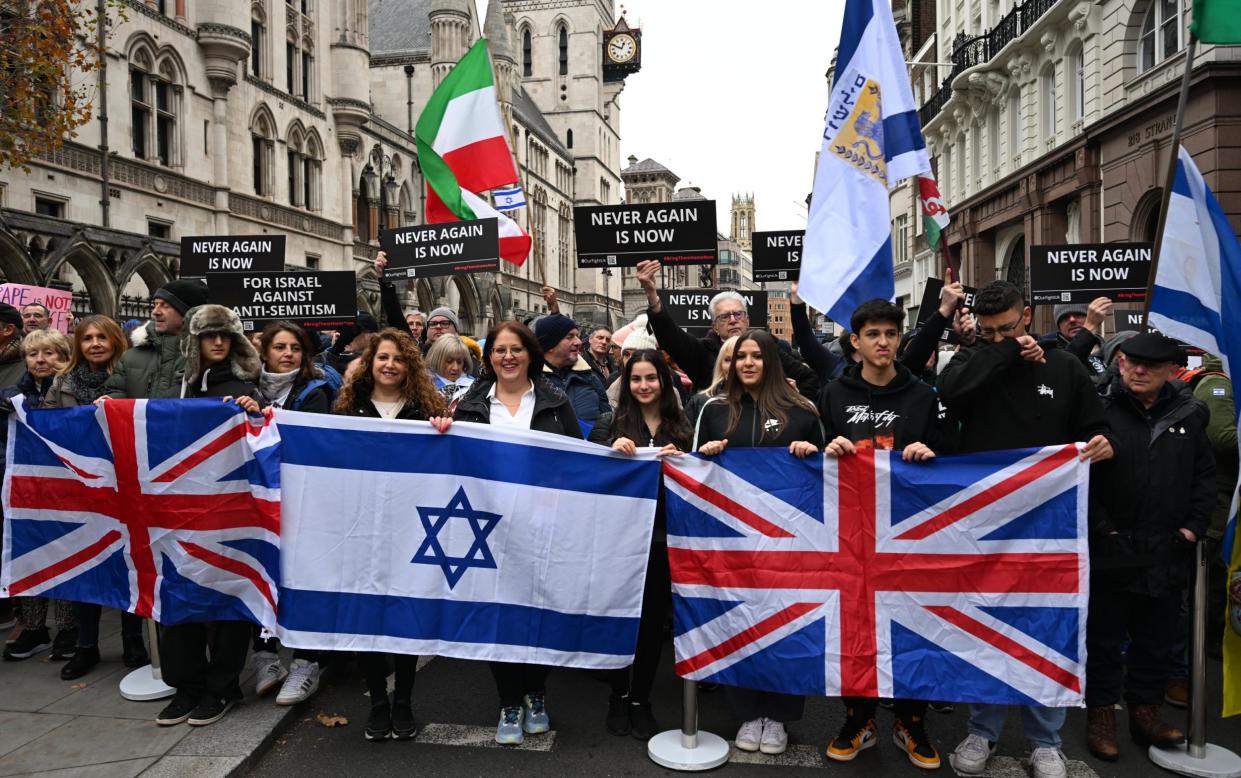Campaign Against Antisemitism cancels London march amid security concerns

The Campaign Against Antisemitism (CAA) has cancelled its “walk together” initiative on Saturday amid safety and security concerns.
Thousands of people were expected to attend the event, which was intended to counter the large pro-Palestinian march planned for the same day. But the CAA has now announced the walk has been cancelled because of concerns over the safety of those taking part.
Gideon Falter, the chief executive of the CAA, had called for supporters to gather and walk through central London in defiance of the weekly anti-Israeli protests.
His call came after he was prevented by police from crossing the road in central London earlier this month as a pro-Palestinian march was going past.
During an exchange with a Metropolitan Police officer, he was told: “You are quite openly Jewish. This is a pro-Palestinian march. I am not accusing you of anything but I am worried about the reaction to your presence.”
Another officer threatened to arrest him if he did not leave the area and the Met was forced to apologise after subsequently suggesting the presence of Jewish people at pro-Palestinian protests was “provocative”.
Sir Mark Rowley’s position came under mounting scrutiny following the incident, with the Prime Minister describing the threat to arrest Mr Falter as “appalling”.
More than 1,000 people were expected to join the “walk together” event on Saturday, which the CAA insisted was not a march or a protest and therefore did not need to be approved by police.
But on Friday, the CAA announced that the decision had been taken to cancel the walk.
March receives threats from ‘hostile actors’
A spokesman for the group said: “We have received numerous threats and our monitoring has identified hostile actors who seem to have intended to come to any meeting locations that we announced.
“The risk to the safety of those who wished to walk openly as Jews in London tomorrow as part of this initiative has therefore become too great.
“We are no less angry about these marches than our Jewish community and its allies. We want to walk.
“We want to force the Met to police these marches, not merely manage them. But we cannot encourage thousands of people to walk when there are such risks to their safety, and there are.
“We have reluctantly decided not to go ahead tomorrow. We will be announcing our plans in the coming days. We are aware of many people who are likely to walk nonetheless, and we urge them to stay safe.”
Protest policing ‘double standards’
The pro-Palestinian march will begin in Parliament Square at 1pm on Saturday and will take a route along Piccadilly and Park Lane before finishing Hyde Park.
A static pro-Israel “Enough is Enough” demonstration is due to take place in Pall Mall on Saturday afternoon but the two events are not scheduled to cross paths.
A CAA spokesman complained that there appeared to be different standards applied to the way marches were being policed.
The spokesman said: “Tomorrow’s march by the Palestine Solidarity Campaign meanders for two-and-a-half miles, from Parliament Square to Reformer’s Tree in Hyde Park.
“When we organised our peaceful March Against Antisemitism a few months ago, we were told that there was no way that Royal Parks could be used.
“Yet again, it seems that there is a double standard. For the hours that this march drags on, central London will be snarled up yet again.
“Police have told us that they intend to handle the march no differently from the passive way that they have become accustomed to over the course of more than six months.”
‘Fear and uncertainty’ in Jewish communities
The Metropolitan Police said pro-Palestinian protests since Oct 7 had resulted in 450 arrests, with 193 of those being for anti-Semitic offences.
The majority of these anti-Semitic incidents involved placards, chanting or expressions of hate speech, the force said.
There have also been 15 terrorism-related arrests, primarily on suspicion of supporting proscribed organisations, notably Hamas.
The current costs of policing operations for the protests stands at approximately £38.5 million, the Met added.
Matt Twist, the assistant commissioner, said: “The cumulative impact of such a lengthy period of sustained significant protests is felt widely, but it has been the particular cause of fear and uncertainty in Jewish communities.
“While there are Jewish groups who do take part in and feel safe doing, there are many others who do not, and feel the impact far beyond the day and location of those marches themselves; this is a reality that should concern us all.
“Overall, just about 45,000 Met officers’ shifts have been dedicated to the policing of these events.
“We’ve had to bring in additional officers from around the country on a number of occasions, using up an additional 9,600 officer shifts. 6,400 officer rest days have been cancelled.”
Mr Twist added that pro-Palestine protests have “never” reached the threshold where there was a “risk of serious public disorder”.
He said: “The only legal route to ban a march is if there is a risk of serious public disorder – that is rioting or serious violence that could not be dealt with by other restrictions or conditions.
“We have never got close to that threshold on these PSC [Palestinian Solidarity Campaign] marches to date.
“We have used the proactive imposition of conditions under the Public Order Act more extensively linked to these protests since October 7, than any other point in the last 30 years.”

